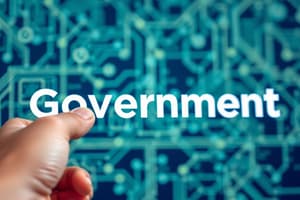Podcast
Questions and Answers
What is a primary focus of the European Union’s AI Act?
What is a primary focus of the European Union’s AI Act?
- Establishing a national strategy for AI dominance
- Promoting AI innovation without restrictions
- Emphasizing industry self-regulation exclusively
- Creating a framework for AI regulation and safety (correct)
Which country’s AI governance model is characterized by state control and ethical considerations?
Which country’s AI governance model is characterized by state control and ethical considerations?
- India
- United States
- Germany
- China (correct)
What describes the U.S. approach to AI regulation?
What describes the U.S. approach to AI regulation?
- Strict regulations mirroring the EU’s AI Act
- A fragmented landscape with varying state laws (correct)
- No regulatory framework in place
- A unified federal regulation system
What challenge is commonly faced by emerging economies in AI governance?
What challenge is commonly faced by emerging economies in AI governance?
What is a key aspect of industry self-regulation in AI?
What is a key aspect of industry self-regulation in AI?
What is a potential benefit of international collaboration in AI governance?
What is a potential benefit of international collaboration in AI governance?
Which factor is most likely to hinder industry self-regulation in AI?
Which factor is most likely to hinder industry self-regulation in AI?
What characterizes the approach of AI governance in India?
What characterizes the approach of AI governance in India?
What is a notable aspect of AI governance in emerging economies?
What is a notable aspect of AI governance in emerging economies?
What is a key feature of the European Union’s AI Act?
What is a key feature of the European Union’s AI Act?
Study Notes
AI Governance: National Strategies Across the Globe
- Different countries adopt unique strategies for AI governance influenced by cultural, political, and economic factors.
- National frameworks emphasize balancing innovation with ethical considerations and societal impacts.
- Key regions experiencing rapid AI advancements face challenges in integration and regulation.
The Role of International Collaboration in AI Governance
- Global collaboration is essential to standardize laws and share best practices across borders.
- Initiatives involve policymakers, industry leaders, and academia to address transnational AI issues.
- International organizations play a pivotal role in fostering dialogue and cooperation between nations.
Industry Self-Regulation in AI: Opportunities and Challenges
- Self-regulation allows the tech industry to create adaptable frameworks that respond to rapidly changing technology.
- Opportunities include increased innovation speed and reduced bureaucratic hurdles.
- Challenges involve ensuring accountability and avoiding conflicts of interest, as industry may prioritize profit over ethics.
AI-Specific Legislation: A Comparative Study
- Various countries are developing AI-specific laws to ensure responsible development and deployment.
- Comparative studies reveal differing legal definitions, regulatory approaches, and enforcement mechanisms.
- Effective legislation requires balancing innovation support with public safety and ethical standards.
The European Union’s AI Act: A Comprehensive Overview
- The EU AI Act seeks to create a harmonized regulatory framework for AI across member states.
- Focuses on risk-based classifications of AI systems, with stricter regulations for high-risk applications.
- Mandates transparency and accountability measures for all AI developers and users.
AI Governance in China: State Control and Ethical Considerations
- China's AI governance is characterized by strong state control, with significant government investment in AI initiatives.
- Ethical concerns arise from surveillance capabilities and privacy issues linked to AI technologies.
- The government implements guidelines to align AI development with national interests and social stability.
The U.S. Approach to AI Regulation: A Fragmented Landscape
- The U.S. lacks a comprehensive federal AI regulation, leading to a fragmented landscape of policies across states.
- Various agencies, like the FTC and NIST, are working on sector-specific guidelines without cohesive national standards.
- Debate continues regarding the role of government versus private sector in regulating AI technologies.
AI Governance in India: Emerging Frameworks and Challenges
- India's approach to AI governance is evolving, with an emphasis on innovation alongside ethical practices.
- Key challenges include addressing infrastructure needs, talent development, and regional disparities in technology access.
- The government is exploring frameworks to ensure AI benefits align with socioeconomic goals.
AI Governance in Emerging Economies
- Emerging economies face unique challenges, including resource constraints and varying levels of technological adoption.
- Governance strategies often seek to leverage AI for economic growth while managing risks related to inequality and access.
- International partnerships can assist in building capacities and creating tailored regulatory frameworks.
Governance of AI in the Public Sector: International Case Studies
- Various countries demonstrate innovative use of AI in public sector governance, enhancing service delivery and decision-making.
- Case studies reveal successes and pitfalls in integrating AI while maintaining public trust and accountability.
- Analyzing these instances provides valuable lessons for ethical AI adoption in government services.
AI Governance: National Strategies Across the Globe
- Different countries adopt unique strategies for AI governance influenced by cultural, political, and economic factors.
- National frameworks emphasize balancing innovation with ethical considerations and societal impacts.
- Key regions experiencing rapid AI advancements face challenges in integration and regulation.
The Role of International Collaboration in AI Governance
- Global collaboration is essential to standardize laws and share best practices across borders.
- Initiatives involve policymakers, industry leaders, and academia to address transnational AI issues.
- International organizations play a pivotal role in fostering dialogue and cooperation between nations.
Industry Self-Regulation in AI: Opportunities and Challenges
- Self-regulation allows the tech industry to create adaptable frameworks that respond to rapidly changing technology.
- Opportunities include increased innovation speed and reduced bureaucratic hurdles.
- Challenges involve ensuring accountability and avoiding conflicts of interest, as industry may prioritize profit over ethics.
AI-Specific Legislation: A Comparative Study
- Various countries are developing AI-specific laws to ensure responsible development and deployment.
- Comparative studies reveal differing legal definitions, regulatory approaches, and enforcement mechanisms.
- Effective legislation requires balancing innovation support with public safety and ethical standards.
The European Union’s AI Act: A Comprehensive Overview
- The EU AI Act seeks to create a harmonized regulatory framework for AI across member states.
- Focuses on risk-based classifications of AI systems, with stricter regulations for high-risk applications.
- Mandates transparency and accountability measures for all AI developers and users.
AI Governance in China: State Control and Ethical Considerations
- China's AI governance is characterized by strong state control, with significant government investment in AI initiatives.
- Ethical concerns arise from surveillance capabilities and privacy issues linked to AI technologies.
- The government implements guidelines to align AI development with national interests and social stability.
The U.S. Approach to AI Regulation: A Fragmented Landscape
- The U.S. lacks a comprehensive federal AI regulation, leading to a fragmented landscape of policies across states.
- Various agencies, like the FTC and NIST, are working on sector-specific guidelines without cohesive national standards.
- Debate continues regarding the role of government versus private sector in regulating AI technologies.
AI Governance in India: Emerging Frameworks and Challenges
- India's approach to AI governance is evolving, with an emphasis on innovation alongside ethical practices.
- Key challenges include addressing infrastructure needs, talent development, and regional disparities in technology access.
- The government is exploring frameworks to ensure AI benefits align with socioeconomic goals.
AI Governance in Emerging Economies
- Emerging economies face unique challenges, including resource constraints and varying levels of technological adoption.
- Governance strategies often seek to leverage AI for economic growth while managing risks related to inequality and access.
- International partnerships can assist in building capacities and creating tailored regulatory frameworks.
Governance of AI in the Public Sector: International Case Studies
- Various countries demonstrate innovative use of AI in public sector governance, enhancing service delivery and decision-making.
- Case studies reveal successes and pitfalls in integrating AI while maintaining public trust and accountability.
- Analyzing these instances provides valuable lessons for ethical AI adoption in government services.
Studying That Suits You
Use AI to generate personalized quizzes and flashcards to suit your learning preferences.
Description
Explore the vital aspects of AI governance and the various regulatory frameworks shaping its global landscape. This quiz covers national strategies, international collaboration, industry self-regulation, and the legislative measures, including the EU's AI Act. Assess your understanding of the ethical and practical implications of AI regulation across different countries.




